My first venture into Africa led me to travel in Morocco for a quick two-and-a-half-week introductory visit. The North African nation attracts a lot of tourists due to its close proximity (about 10 miles) and ease of access to/from the European continent.

An overwhelming majority of the several million tourists that visit Morocco each year hail from Europe. While Morocco is growing more popular as a tourist destination for visitors from the rest of the world, travel to the country still evokes the idea of exotic, offbeat adventure for many non-Europeans.
Prior to arriving in Morocco, my feelings were mixed. On one hand, I was fully aware that the country receives a lot of tourists and has a major tourist industry. On the other hand, it’s Morocco, a place with a drastically different culture to any which I had yet to experience. Moreover, it’s still Africa, and that in itself elicits plenty of curiosity and uncertainty for a first-time visitor to the continent.
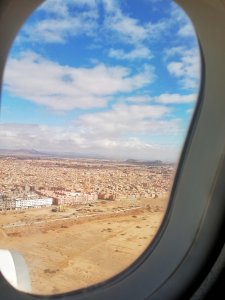
My expectations settled on a combination of both. I hoped Morocco would have a stronghold on its culture – truthfully, I hoped the country still delivered the idyllic scenes from my imagination – but I also expected to encounter a fair amount of tourism. Expecting a certain level of tourist activity also helped ease any nerves or anxiety about visiting Morocco.
So what was it like? Did Morocco meet my expectations? Exceed them? Fall short?
Did I feel safe? Was it easy to get around? Most importantly, how was the food?
The answers to these questions are not simple or straightforward, so I’ll break it down into more detail. First, let’s start with the most important (and my personal favorite) part of travel:
Contents
How is the Food in Morocco?
The simple answer to this question is that the food in Morocco is pretty damn good. Prior to traveling to Morocco, my knowledge of Moroccan food was minimal. I could count the times I’d eaten “Moroccan food” on a single hand.
Moroccan cuisine has similarities and traits to the food in the greater Maghreb region (Northwest Africa) and the Arab World. This means a lot of couscous, bread, beef, mutton, chicken, vegetables and olive oil. Seafood is common in coastal areas. The food is halal, so don’t expect to find any pork chops in Morocco.
Couscous is on every menu in Morocco. It typically comes with flawlessly-cooked vegetables and some meat. I’m not sure what it is about couscous in Morocco, but they do it right. I ate couscous at least once a day for more than two weeks, and I never grew tired of it.
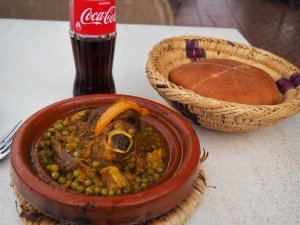
Tagine is the other common dish in Moroccan restaurants. This is basically food cooked in a clay pot. There are a lot of tagine dishes, and I didn’t have a bad one. I really liked the kefta tagine, which is kind of like Moroccan meatballs.
I tried a lot of bread, soup and a few things I still haven’t been able to identify. The different types of bread were quite enjoyable. Most are varying types of flatbread, but, again, I liked all of it. The soup is simple, but good. There is not a lot of cheese in Moroccan food, but the goat cheese I had was great.
The only bad part about eating in Morocco is an overall lack of variety. A lot of restaurants seem to serve the same food. The differences lie mostly in price or quality, but everything else is similar. I’ll blame this one on myself. I’m positive I missed some great Moroccan food, and I’ll have to do better next time.
Moroccan food is generally pretty safe to eat. As long as the food is hot and freshly-made, you’ll probably be fine. A lot of people caution against drinking juice from the fresh-squeezed juice carts. Some of them are pretty filthy. For me, the only time I got sick was after eating a super cheap pizza. It was good, but – let’s just say sitting wasn’t very comfortable for a few days. At least I lost a few pounds.
I enjoyed the food in Morocco. Although I ate similar food for most meals, I never grew tired of it. Other travelers I met were not quite as satisfied, but the food is more than adequate for a short one-or-two-week stint in the country.
What about Booze?
The alcohol situation in Morocco is strange. Due to the “democratic” country being almost entirely muslim, booze isn’t plentiful. From what I was told, local Moroccans are technically not allowed to consume alcohol.
That really sucks for them in the lacking personal freedoms department, but anyone who says Moroccans are a completely teetotaling population is lying. Local citizens in Morocco may not sit in public drinking, but many choose to knock back a few in private.
For tourists, alcohol is legal. Alcohol imports and the local beer industry basically exist to cater to foreigners. So you can have a drink if you so choose, though it’s not widely available. It really depends where you are.

I found beer in Marrakech. On the Atlantic coast, booze was easier to find. Tangier even has real bars. In smaller towns and remote areas, alcohol is less common. In Chefchaouen, I experienced one of the sketchiest alcohol-buying experiences of my life. It was worse than being a teenager and trying to buy from strangers in precarious parts of town. Buying a few beers in Chefchaouen definitely felt illegal.
You don’t travel to Morocco to party and get wasted. But, rest assured, it is possible to enjoy a nice adult beverage at the end of your day.
Getting Around Morocco
Transportation in Morocco is fairly easy to use for tourists. If you choose to stay on the most common tourist route – Marrakech, Fez, Tangier – Morocco is super easy to get around. Connecting to other big cities such as Casablanca or Rabat is also simple and straightforward.

Once I strayed from those places, getting around Morocco was definitely more tedious but still not difficult. Going to the blue tourist trap that is Chefchaouen takes longer than it probably should, but I enjoyed the ride. Even the local buses were pretty comfortable.
Transportation between smaller cities on the Atlantic Coast, those not connected by rail, is slow. However, some of these places are popular with tourists, and there are nice, comfortable buses servicing the larger cities like Agadir or Essaouira.
I don’t like taking taxis. I’ve been ripped off by one too many taxi drivers in Vietnam, Kazakhstan, Turkey and so on. It’s part of traveling, but I’m over it. Unfortunately ride-sharing in Morocco is limited. Ultimately, I had no choice but to take a couple of taxis in Morocco. One of them, in Tangier, was the craziest ride I’ve ever taken. It was actually fun once I gave in to the adrenaline. The key to taking taxis in Morocco is to negotiate a price before you get in the car.
Overall, I found Morocco pretty easy to navigate. Local transportation is extremely cheap, though less comfortable. The nicer buses – Suprabus and CTM – are excellent and still cheap transportation options.
You can read more about transportation in these Hangry Backpacker posts:
Travel Safety in Morocco
I previously wrote about Safety and Scams in Marrakech, but Morocco entails far more than this one city. After getting used to the narrow quarters of the various medinas (old quarters) in the country, I felt pretty safe for the most part.
Full disclosure: I am nearly six-foot-four and weigh over 250 pounds. On one hand, that makes me a less desirable target to piss off. At the same time, blending in or going unnoticed is nearly impossible.
That being said, almost every encounter and situation I had in Morocco (outside of Marrakech) was great. Especially on the Atlantic Coast, the people are friendly and life is pretty chill.
Obviously, I can’t speak to what it’s like to travel in Morocco as a female, but there are accounts floating around of less-than-pleasant experiences. Of course, there are equally as many accounts of female travelers having no issues whatsoever in the country. It would be best to follow customs, remain vigilant and always walk with purpose.
The key to safety in Morocco is exercising caution with whom you trust. Tourists are often easy targets for scams. The most important thing is to have practical travel clothing that hinders street thieves and pickpockets.
Travel in Morocco is largely safe, and that’s why tourism is booming in the country. In my opinion, though, the authorities (from top to bottom) need to act to end the petty theft, scams and other tourist crime if they want that prosperity to continue.
Tourist Sites and Attractions
Morocco might not have a single, world-renowned landmark like the Eiffel Tower or Empire State Building, but the attraction(s) of Morocco is the country itself. The medinas and souks (markets) are fascinating, fun and picturesque.
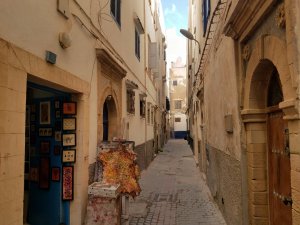
The history of Morocco has left behind ruins and remnants of ancient civilizations. Many of these sites are fantastic tourist attractions. Ouarzazate and Ait Benhaddou are fascinating attractions, and there are many more like them where tourists rarely wander. Unfortunately, I felt that visiting these places was a bit of a sham. Someone is telling you to pay or asking for money at every turn. As attractive as they may be, let’s just say the photos are the best part of visiting.
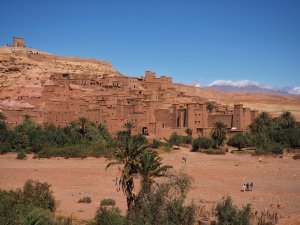
The palaces of Morocco are beautiful. The tilework alone is stunning. Many of these have been restored or preserved to their original glory, but the crowds can be an absolute nightmare.
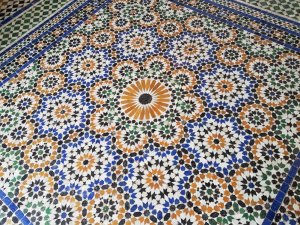
Most visitors to Morocco don’t get very far from cities and towns, but the country has stunning nature to offer, too. The Atlas Mountains traverse the length of the country and contain great hiking trails, waterfalls and dramatic landscapes. The Atlantic Coast is popular with surfers. And the most notorious natural attraction in Morocco is the Sahara desert. Spending time in the desolate dunes of Morocco is a highlight for many of the travelers who venture to the desert.
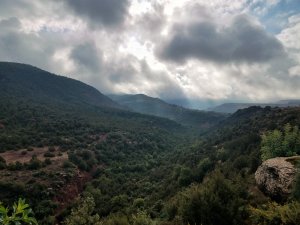
Despite not having any specific landmark that is synonymous with the country, Morocco has a lot to offer. The cities in Morocco nearly top my list of favorite places to just wander around. Once I got comfortable, I thoroughly enjoyed walking around the medinas and souks.
The frustrating part about some of the cool places in Morocco, primarily those that are unreachable by public transport, are the tour operations. So many of these day tour operators are rip offs. In some cases, this is the only way to reach certain attractions, and the entire operation is an attempt to squeeze every penny from the tourist, from start to finish.
Is Morocco Off the Beaten Path?
Prior to my first travel experience in Morocco, the country seemed like it might be an off-the-beaten-path destination. As I wrote above, my hopes were to find at least some semblance of this.
In the eyes of many Americans, travel to places other than North America, the Caribbean, Australia or Western Europe are considered to be unusual or off the beaten path. This has basically been drilled into our minds our entire lives. However, with more Americans traveling to once-uncommon destinations, that sentiment is absolutely changing more each year.
As an American, Morocco is largely considered an unusual travel destination. I think, to most Americans, there is still a perception that the country is inherently dangerous or a chaotic African destination.
I didn’t feel this way, but sometimes we just don’t know until we experience something ourselves or hear first-hand accounts from people we know. Knowing that millions of people visit Morocco each year, I assumed it would most likely have a pretty serious tourist element.
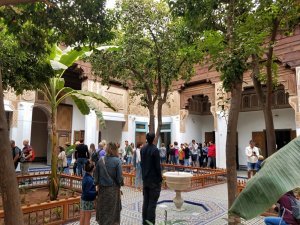
For Americans, it’s not a big deal to go to Mexico – it’s right there. For people from Australia or Western Europe, Mexico probably seems more unusual and off the beaten path.
The same scenario can be applied to Morocco for many Europeans – it’s right there. Tangier is visible from Spain! It’s only a few miles, close enough for Spaniards to take a day trip to Africa.
So, is Morocco off the tourist trail? Is it an off-the-beaten-path destination?
No, at least not for most tourists. Visiting Morocco is not like traveling to Papua New Guinea or the Congo. By all accounts, travel in Morocco is not even comparable to visiting neighboring countries that lag far behind in the tourism sector. It is aided by political stability and development that benefits tourists and citizens.
That doesn’t mean travelers can’t experience a totally different way of life in the country. Whether or not travel in Morocco feels off the beaten path depends on perspective. To me, it did not, but that is only my perspective.
Like any place in the world, you can get away from the tourist bubble with a little effort. Most of the 10+ million tourists who visit Morocco each year go to a few places and that’s it. Outside of these cities, travel in Morocco certainly feels different. I barely got out of the Morocco tourist bubble, but it was obvious when I did. Even walking half a mile from Jemaa El F’na, the Marrakech medina, can feel like a different world.
Is Traveling to Morocco Worth it?
My first trip to Morocco was a learning experience. My expectations were met at times and exceeded at others. There were also a few moments where I simply wanted to leave.
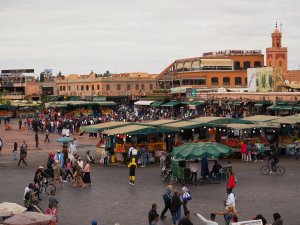
In some ways, such as food and infrastructure, the trip was a pleasant surprise. In other ways, Morocco was a let down. For no reason, I was hassled and yelled at in Morocco more than any other place I’ve been. I’m very much a keep-my-head-down, follow-the-customs kind of traveler, and those unwarranted experiences are hard to shake.
That’s the nature of travel. You never know what a place is like until you visit yourself, and there’s never any guarantee what kind of experience you will have.
Based on my experience, I wouldn’t say Morocco, as a whole, is worth it. It’s not at the top of my recommendations, that’s for sure. Every traveler has a different experience, and, for that reason, I also cannot say that Morocco is not worth visiting.
After having time to reflect, I do want to travel to Morocco again. I would return to Essaouira in a heartbeat, but I wouldn’t be upset if I never stepped foot in Marrakech again. The next time I decide to visit the country, I will travel “smarter” or “more prepared.” Having an idea of what awaits will make the transition easier and the stay more enjoyable.

I plan to go back to Morocco – I will, someday – but I’m not exactly anxious to return anytime soon. Then again, I go where the cheap flights take me.
Leave a Reply
You must be logged in to post a comment.